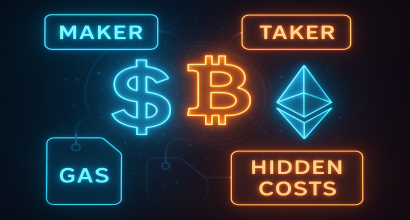CEX vs DEX vs P2P: Which Crypto Exchange Model Fits You?
The Three Models at a Glance
-
CEX (Centralized Exchange): Company-run, custodial, typically easiest for beginners.
-
DEX (Decentralized Exchange): Smart-contract-based, non-custodial, privacy-oriented.
-
P2P (Peer-to-Peer): Direct buyers/sellers, manual settlement methods.
Security & Custody
-
CEX: Professional security + insurance policies in some cases, but custodial risk remains.
-
DEX: You hold keys; smart contracts handle trades, audits, and contract risk matters.
-
P2P: Custody varies; use platform escrow and verify counterparties carefully.
Liquidity & Pricing
-
CEX: Often deepest liquidity and tight spreads on major pairs.
-
DEX: Liquidity depends on the pool; price impact may be higher for large trades.
-
P2P: Price discovery can vary; ideal for local payment rails.
Onboarding & User Experience
-
CEX: Polished UI, fiat deposits, quick starts.
-
DEX: Wallet setup (e.g., MetaMask), network selection, gas fees—steeper learning curve.
-
P2P: Requires negotiation, verifying payment completion, and vigilance against scams.
Fees & Hidden Costs
-
CEX: Maker/taker fees; potential fiat deposit/withdraw fees.
-
DEX: Swap fees + network gas; bridging across chains adds cost.
-
P2P: Platform escrow fee plus any payment method fees.
Compliance & Privacy
-
CEX: Strong compliance (KYC/AML), lowest privacy.
-
DEX: Highest privacy among the three, but watch local regulations.
-
P2P: Varies; platform rules + local laws apply.
Decision Matrix (Quick Guide)
-
Absolute beginner: Start with a CEX for ease and fiat support.
-
Self-custody advocate: DEX with audited contracts.
-
Local rails or unique payment methods: P2P with strict escrow and identity checks.
-
Hybrid approach: Buy fiat-to-crypto on a CEX, then self-custody and use DEX for swaps.
Key Takeaways
-
CEX = convenience and liquidity; DEX = control and privacy; P2P = local flexibility.
-
Consider custody risk, liquidity, fees, and your technical comfort level.
FAQs
Q1: Can I use all three?
Yes—many users on-ramp via CEX, self-custody, then swap on DEX.
Q2: Are DEXs safer?
They remove custodial risk but introduce smart-contract and wallet risks.
Q3: Is P2P risky?
It can be if you skip escrow or verification. Follow platform rules strictly.



















Discussion & Comments